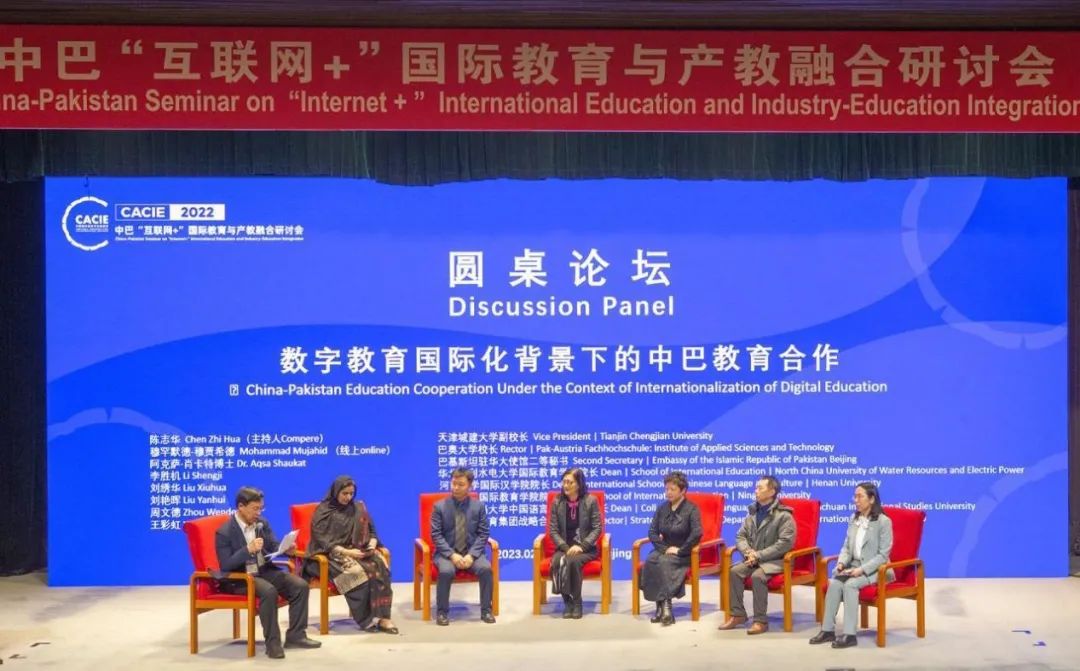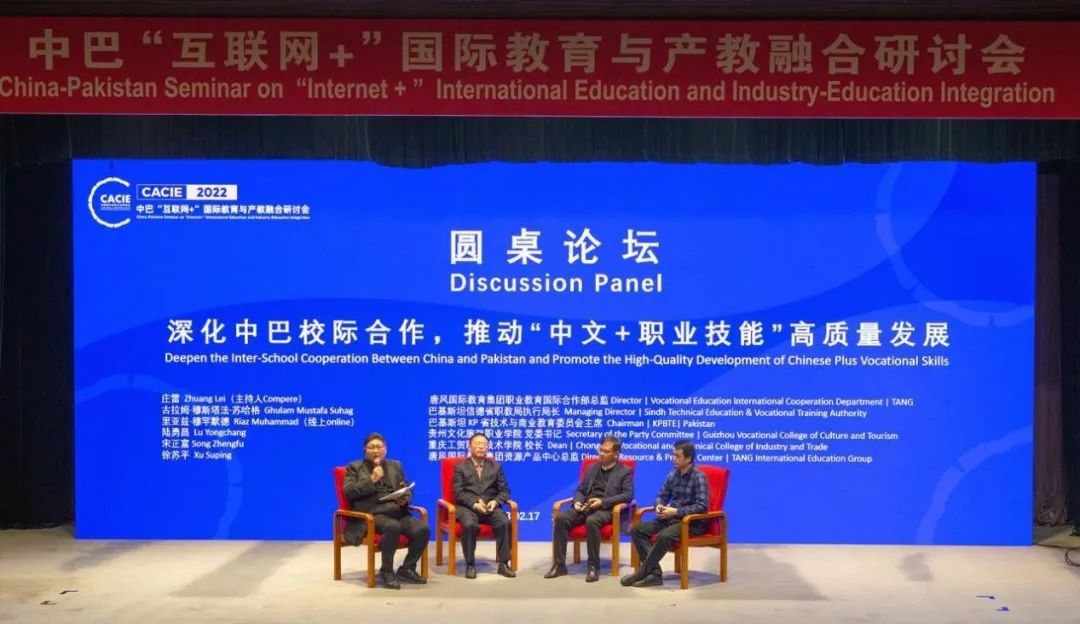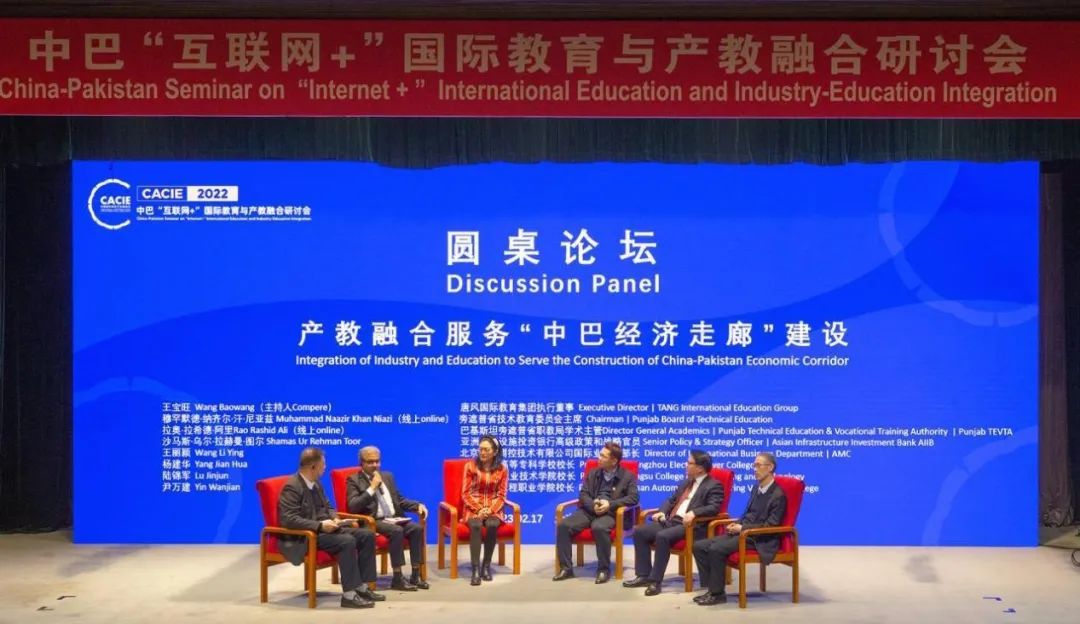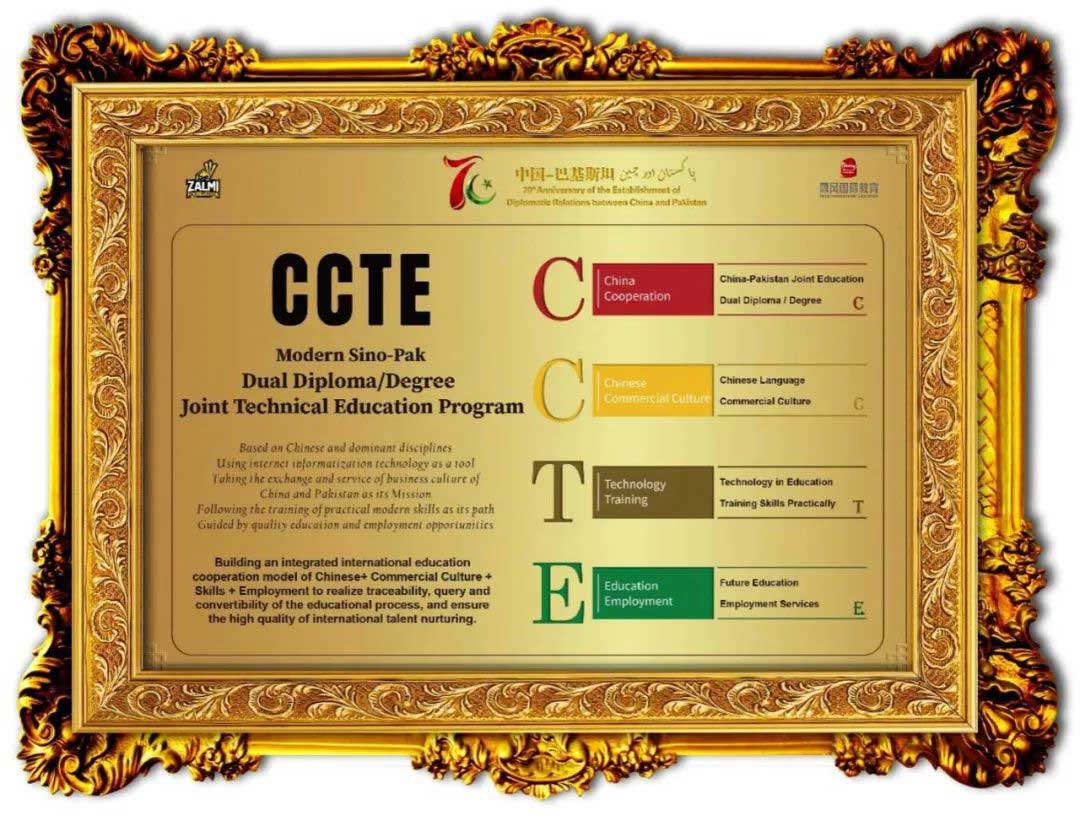On February 17, 2023, the China-Pakistan “Internet +” International Education and Industry-Education Integration Seminar was successfully held at the Beijing International Convention Center. Participants discussed and exchanged in the form of roundtable forums around the three major themes of “China-Pakistan Education Cooperation Under the Context of Internationalization of Digital Education”, “Deepen the Inter-School Cooperation Between China and Pakistan and Promote the High-Quality Development of Chinese Plus Vocational Skills” and “Integration of Industry and Education to Serve the Construction of China-Pakistan Economic Corridor”. Provide advice and suggestions for promoting digital education, integration of industry and education, output of standardization construction, and training of localized talents.
Topic 1 : China-Pakistan Education Cooperation Under the Context of Internationalization of Digital Education

This seminar was presided over by Mr. Chen Zhihua, Vice President of Tianjin Chengjian University, Mr. Mohammad Mujahid, Rector of Pak-Austria Fachhochschule: Institute of Applied Sciences and Technology, Dr. Aqsa Shaukat, Second Secretary of Embassy of the Islamic Republic of Pakistan Beijing, Mr. Li Shengji, Dean of the School of International Education of North China University of Water Resources and Electric Power, Ms. Liu Xiuhua, Dean of the International School Chinese Language and Culture of Henan University, Ms. Liu Yanhui, Dean of the School of International Education of Ningxia University, Mr. Zhou Wende, Dean of the College of Chinese Language and Culture of Sichuan International Studies University, and Ms. Wang Caihong, Director of the Strategic Collaboration Department of Tang International Education Group, and other guests attended and spoke at the forum.
China-Pakistan friendship is all-weather and can stand the test of time. The collaboration between China and Pakistan in the field of education is very extensive and in-depth. There are currently 28,000 Pakistani students studying in Chinese universities and the number of Chinese students studying in Pakistani universities is also increasing. As the construction of the China-Pakistan Economic Corridor enters a new stage, vocational education and technical training in the fields of the Internet, robotics, and artificial intelligence is also more important.
Mr. Mohammad Mujahid said the National International Development Collaboration Agency had approved financial support for the establishment of centers of excellence in areas such as artificial intelligence, mineral processing, agriculture and food technology, and railway systems engineering. In addition, Pak-Austria Fachhochschule is still preparing funds for projects with commercial value, plans to place teachers and students in related industries for training, promote localized talent training, and effectively carry out projects. At the same time, Dr. Aqsa Shaukat expressed the hope that Pakistani youth can receive professional training from China, and welcomes more and more Chinese students come to Pakistan to participate in educational projects.
Talking about the future positioning of running overseas schools, Dean Liu Yanhui said: “Both parties in collaboration should empower each other, empower each other to grow, and make progress together.” At the same time, Dean Liu Xiuhua pointed out that Tang International Education Group has signed collaboration agreements with many institutions in Pakistan, which can promote the collaboration between Chinese and Pakistani institutions. Through Tang International Education Group’s platform, resource sharing, professional co-construction, and even credit recognition can be realized. I would like to express my deep respect to Tang International Education Group for its contribution to the cause of international Mandarin education.
In addition, Dean Li Shengji and Dean Zhou Wende expressed their unique views on digital education and talent training models. At present, we are in a new era of “One Belt, One Road” and “China-Pakistan Economic Corridor + Digital Education, Integration of Industry and Education”. Through the construction of “artificial intelligence + discipline group”, realize the “combination of literature and industry”, “combination of arts and science”, and “combination of literature and literature” to meet the needs of nationalization, regionalization, industrialization and talent training.
Topic 2 : Deepen the Inter-School Cooperation Between China and Pakistan and Promote the High-Quality Development of Chinese Plus Vocational Skills

This seminar was presided over by Mr. Zhuang Lei, Director of Vocational Education International Cooperation Department of Tang International Education Group, Dr. Ghulam Mustafa Suhag, Managing Director of Sindh Technical Education & Vocational Training Authority, Mr. Riaz Muhammad, Chairman of Khyber Pakhtunkhwa Board of Technical Education (KP BTE, Pakistan), Mr. Song Zhengfu, Dean of Chongqing Vocational and Technical College of Industry and Trade, Mr. Lu Yongchang, Secretary of the Party Committee of Guizhou Vocational College of Culture and Tourism, Mr. Xu Suping, Director Resource and Product Center of Tang International Education Group attended and spoke at the forum.
From 2021, Tang International Education Group has successively signed comprehensive collaboration agreements with the Punjab Vocational Education Bureau of Pakistan, Sindh Vocational Education Bureau, Balochistan Vocational Education Bureau and KP Vocational Education Bureau. Dr. Ghulam Mustafa Suhag said that among the more than 750 vocational education majors in China, Tang International Education Group selected the 210 majors most needed in Pakistan and introduced them in the CCTE mode. It plays a very important role in promoting China-Pakistan modern curriculum standards and the cultivation of skilled talents.
Chairman Riaz Muhammad pointed out that due to the development of infrastructure and the development of the information industry, purely inland provinces like KP Province have now become the frontier of opening up.
In addition, Dean Song Zhengfu and Secretary Lu Yongchang expressed their views on “Mandarin + vocational skills”. Dean Song said that the institute itself provides one-year Mandarin learning and two-year technical training for international students. Now the “2+1” model signed by Tang International Education Group and the relevant vocational education bureau in Pakistan just meets this school-running demand. Secretary Lu believes that under the current cultural background of a community with a shared future for mankind, culture must be given top priority, and the path must be closely integrated with regional characteristic majors. The most important thing is to have advanced foreign cultural exchanges and an open school-running system.
Finally, Director Xu Suping discussed with the guests on how to build Chinese vocational education standards, how to go out, how to implement, and how to develop. He emphasized that the formulation of standards should be based on the actual conditions of China and Pakistan, combined with some of their respective experience and accumulation, and carry out international transformation. So that the output can adapt to its development. In addition, only when local teachers have mastered the subject application supported by modern platforms can the country carry out real standard certification, which is also a responsible standard output. Up to now, Tang International Education Group has conducted overseas certification and promotion of more than 30 institutions and more than 60 courses according to this standard, and it is still in progress.
Topic 3 : Integration of Industry and Education to Serve the Construction of China-Pakistan Economic Corridor

This seminar was presided over by Mr. Wang Baowang, Executive Director of Tang International Education Group, Dr. Muhammad Naazir Khan Niazi, Chairman of Punjab Board of Technical Education, Mr. Rao Rashid Ali, Director General Academics of Punjab Technical Education and Vocational Training Authority (Punjab TVET), Mr. Shamas Ur Rehman Toor, Senior Policy and Strategy Officer of Asian Infrastructure Investment Bank (AIIB), Ms. Wang Liying, Director of International Business Department of Aerospace Measurement and Control (AMC), Mr. Yang Jianhua, President of Zhengzhou Electric Power College, Mr. Lu Jinjun, President of Jiangsu College of Engineering and Technology, Mr. Yin Wanjian, President of Hunan Automotive Engineering Vocational College attended and spoke at the forum.
The China-Pakistan Economic Corridor is a demonstration project and a flagship project of our “Belt and Road” initiative, and it is also an important part of our building a community with a shared future for mankind. Chairman Dr. Muhammad Naazir Khan Niazi pointed out that Pakistan currently has a very large number of young people, but insufficient education, especially vocational and technical education, resulting in a huge gap between market demand and education supply. With the construction of the China-Pakistan Economic Corridor, the demand for technical talents will become more and more urgent.
Director Rao Rashid Ali said that a memorandum of collaboration has been signed with Guangdong and other places, and there are many technical collaborations. There will be many “Mandarin +” project training centers in the future. Mr. Shamas Ur Rehman Toor told his own growth story, which led to the mutual promotion and complementarity between academia and industry. He believes that the education industry emphasizes the integration of production and education, and the industry emphasizes the mutual promotion of production and education. What can we do to promote the integration of industry and academia? This question is worth pondering.
When it comes to localized talent training and school-enterprise collaborative innovation, Director Wang Liying believes that in order for an enterprise to develop, the construction of a talent team is long-term, not a single one, and must be considered as a whole. Different from the simple demand for foreign trade experience and foreign language proficiency in the past, we now need more professional and high-quality talents to land in the countries we need.
President Yang Jianhua said that there is a lot of room for collaboration between us and Pakistan in the cultivation of electric power science and technology talents. President Yang also said that participating in this seminar is also representing more than ten electric power institutions to seek collaboration with Pakistan vocational education and Tang International Education Group on the platform.
President Lu Jinjun believes that China-Pakistan textile vocational education needs school-enterprise collaboration. First, join hands with well-known enterprises already in Pakistan, or the textile industry that is about to develop in Pakistan. Work with them to cultivate high-end textile and garment technical Pakistani localization talents who understand Mandarin, understand Chinese culture, and master the textile service technology. The second is to use Tang International Education Group’s platform to localize our courses, teaching materials, especially teachers, and cultivate technical talents suitable for the development of Pakistan’s textile industry.
Finally, President Yin Wanjian said that when we go abroad, we need to conduct in-depth research on our Chinese-funded enterprises, and even Pakistani enterprises. Understand the needs, and then promote the customized collaboration between institutions and enterprises according to the needs, especially for the local training of teachers and students, and do a good job in the integration of production and education.
The friendship between China and Pakistan has a long history, and the “hardcore” friendship lasts forever. The successful holding of the China-Pakistan “Internet +” International Education and Industry-Education Integration Seminar will promote the integration and development of China’s vocational education system and Pakistan’s vocational education system. In the future, Tang International Education Group also looks forward to sharing wisdom with more experts, entrepreneurs, and the international community to better serve the “Belt and Road” initiative and the construction of the China-Pakistan Economic Corridor. Contribute to the deepening of China-Pakistan educational collaboration and the integration of production and education.


